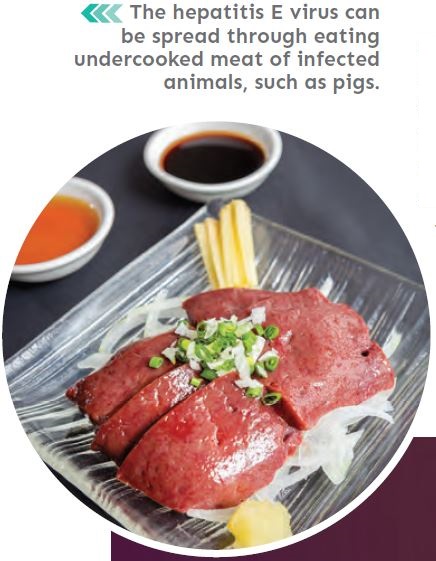Hepatitis E linked to undercooked pork, pig liver and offal, study finds.
Overcooked pig liver may not taste good, but undercooked liver can be harmful.
According to a study by the Singapore General Hospital (SGH), eating undercooked pig liver heightens the chance of getting hepatitis E infection. Hepatitis E is a virus that infects the liver, and can be dangerous for pregnant women, those with a weak immune system such as transplant patients, and those with a chronic liver disease.
“The safest way of consuming food, including pork, is to cook it thoroughly,” said Dr Chan Kwai Peng, senior author of the study, and Senior Consultant, Department of Microbiology, SGH.
Published in peer-reviewed medical journal Zoonoses and Public Health, the article revealed that the incidence of hepatitis E in Singapore has been trending upwards — from 1.7 cases in 100,000 residents in 2012 to 4.1 in 2016 (or 1 in 25,000). The hepatitis E-infected individuals tended to be Chinese men aged 55 years and older.
The study findings also suggested that hepatitis E was increasingly prevalent in the resident population, whereas it had been a disease that was mainly imported from the Indian subcontinent.
The researchers had examined 449 archived serum samples collected between 2014 and 2016, as well as 36 pig liver samples bought from markets. Genotypes (the genetic makeup of cells) obtained from 143 human samples identified the majority to be genotype 3, 21 to be genotype 1, and one to be genotype 4. Furthermore, genotype 3a was found to be the likely cause of indigenous infections in residents, which showed a genetic similarity to the genotype 3a strains detected in pig livers.
 This link between the strains in the majority of human samples and those in pig livers consumed by the public suggests a possible food-borne route of hepatitis E infection in Singapore, the research team said.
This link between the strains in the majority of human samples and those in pig livers consumed by the public suggests a possible food-borne route of hepatitis E infection in Singapore, the research team said.
“Although we could not ascertain if pig liver is the main contributor of hepatitis E cases in Singapore, we observed that pig liver can be found in many local dishes. As most people like it a little undercooked for its texture, this may put them at risk of hepatitis E infection,” Dr Chan advised.
The virus is spread through water contaminated by faeces, or eating raw or undercooked meat of infected animals. Animals such as pigs, wild boar and deer are zoonotic reservoirs of hepatitis E and other diseases that can be transmitted to humans. In Europe, the consumption of raw or undercooked pork or pork products is the most common cause of hepatitis E infection. In 2010, Hong Kong’s Centre for Food Safety issued a report about eating undercooked pig livers for the same reason.
Most people infected with the virus show no symptoms, and the infection goes away on its own after a few weeks. It usually does not lead to longterm illness or liver damage, but can be serious for some groups of people, as mentioned earlier. When symptoms do show up, they include running a fever, feeling very tired, and becoming nauseated and jaundiced.
